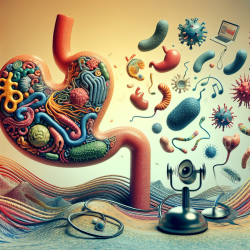Introduction
As practitioners in the field of speech language pathology, our primary goal is to foster the best possible outcomes for children. An emerging area of interest is the role of gastric microbiota and Helicobacter pylori (H. pylori) in gastroesophageal reflux disease (GERD). The recent study, "Analysis of gastric microbiota and Helicobacter pylori infection in gastroesophageal reflux disease," provides crucial insights that can be translated into clinical practice.
Key Findings from the Study
The study evaluated the gastric microbiota in GERD patients, distinguishing between Erosive Reflux Disease (ERD) and Non-erosive Reflux Disease (NERD). Significant differences in microbiota diversity were observed between these groups, influenced heavily by the presence of H. pylori.
- Alpha diversity was significantly lower in NERD patients with H. pylori compared to gastritis patients, indicating that H. pylori impacts microbiota diversity.
- ERD patients exhibited a distinct microbiota composition, with a notable presence of Anaerobacillus sp.
- H. pylori-negative samples showed that ERD had significantly lower richness than both gastritis and NERD groups.
Implications for Practitioners
Understanding these findings can enhance the treatment and management of GERD in children. Here are some actionable steps:
- Evaluate for H. pylori: Consider testing for H. pylori in children with GERD symptoms, as its presence can significantly alter gastric microbiota and impact disease progression.
- Monitor Microbiota Diversity: Pay attention to the diversity of gastric microbiota. A decrease in diversity may indicate a more severe form of GERD.
- Holistic Approach: Integrate these microbiota insights with other factors such as diet, lifestyle, and medical history to create a comprehensive treatment plan.
Encouraging Further Research
The study underscores the need for further research to fully understand the role of gastric microbiota in GERD. Practitioners are encouraged to contribute to this growing body of knowledge by documenting and sharing their clinical observations.
Conclusion
Implementing these research findings into clinical practice can potentially improve outcomes for children suffering from GERD. By considering the role of gastric microbiota and H. pylori, practitioners can offer more targeted and effective treatments.
To read the original research paper, please follow this link: Analysis of gastric microbiota and Helicobacter pylori infection in gastroesophageal reflux disease.










